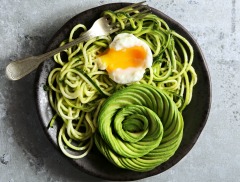Don't just meal plan... meal plan intelligently - with Meal Genius! Sign up for our free newsletter to get delicious recipes, sample meal plans and a whole lot more!
Bananas
Bananas were one of the first fruits to be cultivated by man and have the number one vote as Americans’ favorite fruit.
A tropical fruit, the banana is best known for being a good source of the important mineral potassium. Green bananas are rich in fructoologosaccharides (FOS) that benefit gastrointestinal health and the amino acid tryptophan best known for its calming effect and use as a sleep aid.
Glycemic Index=51
Glycemic Load=12
Antioxidant Score (ORAC)=879
TEST
The Benefits
- Special diets: Autoimmune Paleo Diet, Elimination Diet, Gluten-Free Diet, Gluten-Free/Dairy-Free Diet, Grain-Free Diet, Low Acid Diet, Low FODMAP Diet, Low Histamine Diet, Low Oxalate Diet, Paleo Diet (Light), Paleo Diet (Strict), Pescetarian Diet, Primal Diet, Vegetarian Diet, Whole Food
- Excellent Source of:
- Good Source of: Fiber, Potassium, VitaminB6, VitaminC, Manganese
- Preferences: No Fish, No Red Meat, No Pork, No Eggs, No Shellfish, No Gluten, No Nuts, No Seeds, No Soy, No Dairy, No Poultry, No Corn, No Yeast, No Peanuts, No Coconut, No Molds, No Citrus, No Pseudograins, No Nightshade, No Legumes, No Grains, Low Cholesterol, Low Fat, Low Sodium, Low Saturated Fat
Related Nutrients
Selecting and Storing
Bananas should be plump, firm, and brightly colored. Look for unblemished fruit with their stem ends and skins intact. A split skin or stem may become an entry point for contamination. Bananas bruise easily, so handle them with care. To speed ripening, put them in a loosely closed paper bag (an apple in the bag will further speed the process). Once ripened to your liking, bananas can be held at room temperature for a day or two. Storing in the refrigerator to slow down ripening- although the skins will turn dark, the fruits will remain edible. You can keep refrigerated bananas for up to two weeks.









